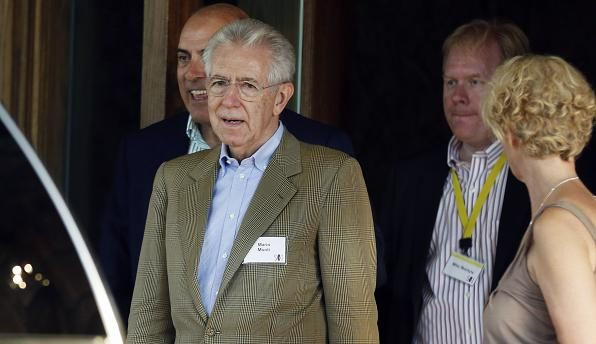Italy PM Mario Monti's Surprise Resignation Roils Electoral Waters, Potentially Shocking Markets

Italian political manuevering was suddenly thrust into high gear Sunday after the surprise resignation of Prime Minister Mario Monti.
Monti submitted his resignation to President Giorgio Napolitano Saturday night after ousted Prime Minister Silvio Berlusconi attacked the technocrat's stewardship of the economy and announced his bid for a comeback, according to the Telegraph of London.
A statement by the president's office said Monti had told the head of state that without the support of Berlusconi's People of Freedom party, or PDL, "he cannot further carry out his mandate, and consequently made clear his intention to resign."
Monti's decision came after PDL members abstained or withdrew from a vote in the Senate on a package of economic measures Thursday.
The prime minister said he would resign after crucial budget legislation is adopted, the Telegraph said. That OK is likely to come before the end of the year, which should force early elections after leaders across the political spectrum immediately pledged to approve the law as quickly as possible.
Monti's resignation came just hours after Berlusconi announced his intention to run for a fourth term as prime minister and only a day after Angelino Alfano, the leader of Berlusconi's party, said the Monti administration had run its course.
"I felt really angry reading those words," Monti said. "I reached the conclusion that I couldn't go forward like that."
Monti's announcement plunged Italy into political turmoil with national elections previously planned for March now expected to be moved up to February.
On the left, the Democratic Party, or PD, and the Union of the Center, or UDC, "identify with the reasonable and responsible policies Monti has made," UDC leader Pier Ferdinando Casini said on Sunday, Reuters reported.
"A large part of civil society does not want to return to the populism and demagoguery of the [Berlusconi] past. We must give them the political offering they seek," Casini told SkyTG24 television.
PD leader Pier Luigi Bersani praised Monti's intention to quit right after the passage of the budget, saying it showed great dignity, Reuters reported. Last week, Bersani won a U.S.-style primary vote as he promised to continue down the path taken by the prime minister.
Bersani's PD leads Berlusconi's PDL by at least 16 percentage points, according to recent opinion polls, Reuters said.
The uncertainty is likely to unsettle financial markets already concerned about Italy's bleak economic outlook, and it comes after a dire warning by Standard & Poor's that it may review the country's credit rating should its recession continue next year, the Telegraph reported.
Early elections in Italy must not hinder Monti's economic reforms, European Commission President Jose Manuel Barroso warned in an interview with financial daily Il Sole 24 Ore.
"The next elections must not serve as a pretext for putting in doubt how indispensable these measures are," Barroso said in Sunday's edition. "The relative calm on the markets does not mean we are out of the crisis."
Berlusconi's withdrawal of support for the government last week triggered a new rise in 10-year bond yields, the main barometer of market opinion, reversing weeks of steady falls. The yield on the 10-year BTP Italia stood at 4.5 percent at the end of last week, 323 basis points higher than the yield on lower-risk German 10-year bunds, but still much lower than the level of 7.3 percent seen last year.
A great deal will depend on how investors view the prospect of a potentially messy election campaign and a likely government of the center-left, led by a former communist, Reuters noted.
Erik F. Nielsen, chief economist at Italy's largest bank, Unicredit, called Berlusconi's possible return a "gamble" and warned investors that the upheaval would lead to a selloff in Italian assets on Monday and fuel market volatility in the months ahead, according to the Telegraph.
Berlusconi, a billionaire media magnate, met with Alfano and other PDL leaders at his luxury villa at Arcore outside Milan and was also expected to begin talks with his former coalition partner, the Northern League, the Telegraph reported.
But Berlusconi's first challenge is to win support for his party as its popularity recently reached a record low of 14 percent. Making this challenge even more daunting, several of his own members of parliament, including former Foreign Minister Franco Frattini and former Youth Minister Giorgia Meloni, have been openly critical of his comeback intentions.
© Copyright IBTimes 2024. All rights reserved.






















